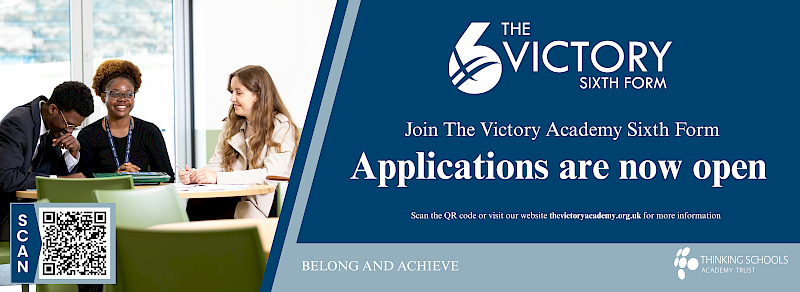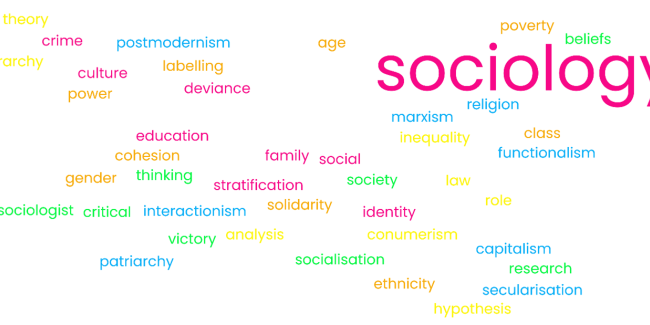
Applications for The Victory Academy Sixth Form are now open! To apply please click here.

Applications for The Victory Academy Sixth Form are now open! To apply please click here.
Sociology is the study of society. It is relevant to students’ lives and can be helpful for them to develop knowledge and understanding of their own society and wider society at both a local and global level.
We study Sociology in order to understand our social context, exploring sociological theory on how society is structured and examining the causes and solutions of social problems. Students will develop an awareness of the ways in which society develops over time through the study of both contemporary and historical social issues and how one has influenced the other.
We aim for Sociology to help our students make sense of the world they live in, encouraging them to develop an appreciation of diversity, choice and the fluid nature of changes within society.

Students will explore topics that are relevant and, at times, controversial. This inspires students to critically engage with issues in society and develop their knowledge on key social debates, such as gender inequality, poverty and crime. The curriculum challenges our students through a rigorous course of study. We take into consideration the experiences of our students and barriers they may face and engage them with opportunities to apply their knowledge and aim to develop an understanding of complex issues.
Students will work towards becoming independent, critical thinkers who learn to question what is presented as ‘normal’ in society. Students become aware of the role of agents of change in society and take a more active approach to their everyday interactions. We expect our students to develop enhanced verbal and written communication skills, and to develop their ability to analyse and debate. Overall, we hope that studying Sociology will lead students to become critical thinkers and all-rounded, active members of society.
Sociology can be taken at GCSE level, A level or both at the Victory Academy.
Both courses offering the opportunity to develop critical thinking skills and an understanding of society.
The course structure allows students to apply different theoretical perspectives, such as Marxism and Feminism, and to appreciate the different perspectives from which an issue can be approached. Importantly, students will acquire the skills to evaluate key ideas and to challenge differing views on social issues. We aim for students to develop into thoughtful and reflective individuals who are able to take an analytical approach to what is presented to them.
Introduction to Sociology
Research methods:
Paper 1
Families:
Education:
Paper 2
Social Stratification:
Crime and Deviance:
Paper 1
Education:
Methods in Context:
Theory and Methods:
Paper 2
Culture and Identity:
Beliefs in Society:
Paper 3
Crime and Deviance:
The curriculum is designed to help the students to acquire a large body of knowledge over a two-year period. All students will need to successfully comprehend a wide range of key concepts, and to be able to use these to analyse social issues. Students will also need to be able to construct well-argued, analytical and evaluative essays.
Students are regularly formatively assessed via short answer knowledge recall questions, and through extended writing tasks. Additionally, there is regular interleaving of knowledge from across the course content to ensure students are confident. Termly assessment data is used to judge the success of the curriculum and progress towards mastery, with teaching time allocated to the re-teaching of specific knowledge. Particularly in Year 13, a proportion of curriculum time is given to interleaved revision of the broad curriculum content. Twice-yearly mock examinations afford students the opportunity to hone their examination skills and embed improvements.
Students are encouraged to deepen their critical faculties and move from knowledge recall to application and evaluation. Peer and self-assessment are used to support students to develop into independently capable learners.
Examinations
The exams will measure how students have achieved the following assessment objectives.
Studying Sociology equips students for a range of opportunities beyond KS5. This might include: